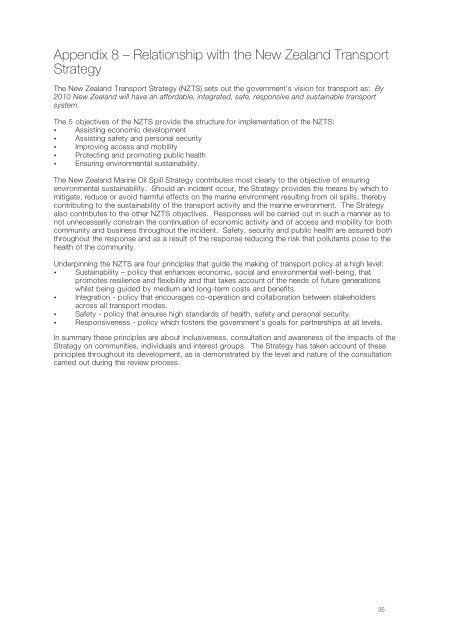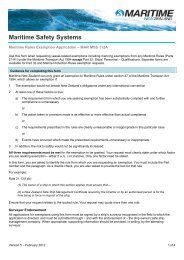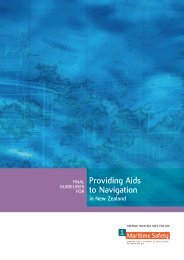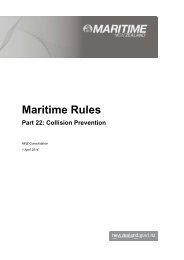New Zealand oil spill response strategy - Maritime New Zealand
New Zealand oil spill response strategy - Maritime New Zealand
New Zealand oil spill response strategy - Maritime New Zealand
You also want an ePaper? Increase the reach of your titles
YUMPU automatically turns print PDFs into web optimized ePapers that Google loves.
Appendix 8 – Relationship with the <strong>New</strong> <strong>Zealand</strong> Transport<br />
Strategy<br />
The <strong>New</strong> <strong>Zealand</strong> Transport Strategy (NZTS) sets out the government’s vision for transport as: By<br />
2010 <strong>New</strong> <strong>Zealand</strong> will have an affordable, integrated, safe, responsive and sustainable transport<br />
system.<br />
The 5 objectives of the NZTS provide the structure for implementation of the NZTS:<br />
• Assisting economic development<br />
• Assisting safety and personal security<br />
• Improving access and mobility<br />
• Protecting and promoting public health<br />
• Ensuring environmental sustainability.<br />
The <strong>New</strong> <strong>Zealand</strong> Marine Oil Spill Strategy contributes most clearly to the objective of ensuring<br />
environmental sustainability. Should an incident occur, the Strategy provides the means by which to<br />
mitigate, reduce or avoid harmful effects on the marine environment resulting from <strong>oil</strong> <strong>spill</strong>s, thereby<br />
contributing to the sustainability of the transport activity and the marine environment. The Strategy<br />
also contributes to the other NZTS objectives. Responses will be carried out in such a manner as to<br />
not unnecessarily constrain the continuation of economic activity and of access and mobility for both<br />
community and business throughout the incident. Safety, security and public health are assured both<br />
throughout the <strong>response</strong> and as a result of the <strong>response</strong> reducing the risk that pollutants pose to the<br />
health of the community.<br />
Underpinning the NZTS are four principles that guide the making of transport policy at a high level:<br />
• Sustainability – policy that enhances economic, social and environmental well-being, that<br />
promotes resilience and flexibility and that takes account of the needs of future generations<br />
whilst being guided by medium and long-term costs and benefits.<br />
• Integration - policy that encourages co-operation and collaboration between stakeholders<br />
across all transport modes.<br />
• Safety - policy that ensures high standards of health, safety and personal security.<br />
• Responsiveness - policy which fosters the government’s goals for partnerships at all levels.<br />
In summary these principles are about inclusiveness, consultation and awareness of the impacts of the<br />
Strategy on communities, individuals and interest groups. The Strategy has taken account of these<br />
principles throughout its development, as is demonstrated by the level and nature of the consultation<br />
carried out during the review process.<br />
35

















